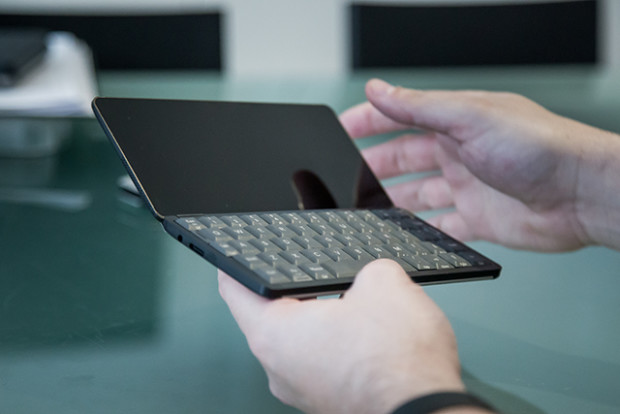

Gemini, the clamshell Android smartphone with an integrated touch-type keyboard, has begun shipping to its initial backers, with British start-up Planet Computers taking orders for a second production run.
The device is inspired by the Psion Series 5, a 1990s-era forerunner of the modern smartphone.
Psion is closely linked with the early history of smartphones – it developed the Symbian operating system used by most major mobile manufacturers for their smart devices until it was made obsolete by the iPhone and Android.
For the Gemini, Planet – comprised of a core team of three people – worked with Martin Riddiford and his design consultancy Therefore, which helped design the original Psion.
Key to the new device is the Riddiford-designed keyboard, which aims to replicate a feature no modern smartphone has been able to match so far – the ability to touch-type on an integrated physical keyboard.
Like the Psion 5, the device folds open to reveal the keypad and an ultra-wide, high-resolution touchscreen measuring just under 6 inches. When closed, the Gemini is about the dimensions of a standard plus-size smartphone.
It’s only 1.51 cm thick and weighs 320g, with dual USB-C connectors for external keyboards, screens, mice and charging cables. Planet is offering versions offering 4G and Wi-Fi or Wi-Fi only.
Gemini features a MediaTek Helio X27 ten-core processor with 4GB of RAM and 64GB of storage, with a replaceable 400 mAh battery that offers two weeks of standby time and 12 hours of talk time.
Planet is working with a third-party partner called Private Planet to customise popular Android software for the horizontal screen and physical keyboard, but any Android software will run as-is.
For its initial production run, the company crowdfunded more than $1.8 million (£1.3m) from more than 5,300 backers, more than twice its target.
While billed as a dual-boot device able to run a desktop Linux operating system as well as Android, the first devices will only run Android for now.
Planet said it’s still working on Linux performance and hardware support issues. Once they’re resolved, it plans to release a flashing tool that will allow users to install Linux or custom ROMs. Planet also said it would release the source code for Gemini’s bootloader and Linux kernel.
Linux versions including Debian, Ubuntu, Sailfish, and Postmarket OS are already partially supported, with core features including 4G connectivity working.
Early reviewers have reported problems typical of a first release, including difficulties getting SIM cards to work and issues with the built-in launcher toolbar and the screen unlock mechanism.
But Planet has also been quick to release fixes, including a new keyboard driver that’s available on Google’s Play Store, along with other customised Gemini software.
And the device has been praised for the main draw, its keyboard, which users said worked surprisingly well with Microsoft Word.
As Planet puts it on the project’s Indiegogo funding campaign page, Gemini is designed for “typing, writing, being productive and creating on the go”.
What do you know about mobiles past and present? Try our quiz and find out!
Binance BNB token rises after WSJ report the Trump family is in talks to secure…
After failed Amazon deal, iRobot warns there is “substantial doubt about the Company's ability to…
Community Notes testing across Facebook, Instagram and Threads to begin next week in US, using…
Complete 180. FTC attorney now says federal agency can pursuit Amazon trial, after citing “severe…
Former board member and respected chip industry veteran Lip-Bu Tan appointed to lead troubled US…
MPs demand secret High Court hearing be held in public, after government had ordered a…